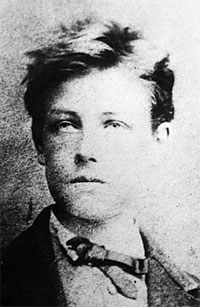Arthur Rimbaud
|
|
- "Rimbaud" redirects here. For other uses see Rimbaud (disambiguation)
Jean Nicolas Arthur Rimbaud (October 20, 1854 – November 10, 1891) was a French poet.
He was born into the rural middle class of Charleville (now part of Charleville-Mézières) in the Ardennes département in northeastern France. As a boy Rimbaud was a restless but brilliant student. By the age of fifteen, he had won many prizes and composed original verses and dialogues in Latin.
In 1870 his teacher Georges Izambard became Rimbaud's first literary mentor, and his original verses in French began to improve rapidly. He frequently ran away from home and may have briefly joined the Paris Commune of 1871, which he portrayed in his poem "L'Orgie parisienne ou Paris se repeuple" (the Parisian orgy or Paris repopulates). He may have been a victim of sexual assault by drunken Communard soldiers (his poem "Le Cur supplicié" - "The Tortured Heart" - suggests so). By then he becomes an anarchist, starts drinking and amuses himself by shocking the local bourgeois with his shabby dressing and long hair. At the same time he writes to Izambard and Paul Démeny about his method for attaining poetical transcendence or visionary power through a "long, immense and rational derangement of all the senses" ("Les lettres du Voyant" - "The Letters of the Seer"). He returned to Paris in late September 1871 at the invitation of the eminent Parnassian poet Paul Verlaine (profoundly impressed by the reading of Rimbaud's masterwork "Le bateau ivre", "The Drunken Boat"), moving briefly into Verlaine's home. Verlaine (who was bisexual), promptly fell in love with the sullen blue-eyed overgrown (5 ft 10 in) light-brown haired adolescent, and shortly after they became lovers, leading a dissolute vagabond-like life, rocked by absinthe and hashish taking. They scandalized the Parisian literary elite, particularly on account of the outrageous behaviour of Rimbaud, the archetypical enfant terrible. Throughout this period he continued to write strikingly visionary, modern verses, topping his master Charles Baudelaire.
Rimbaud's and Verlaine's stormy homosexual relationship swept them to London in 1872, when Verlaine left his wife and infant son (whom he used to mistreated badly during his alcoholic rages). In July 1873, after a particularly violent quarrel in Brussels train station, Verlaine shot Rimbaud in the wrist. Fearing for his life, Rimbaud called for the police. Verlaine was arrested and subjected to an humiliating medico-legal examination, following the perusal of their compromising correspondance and the accusations of Verlaine's wife about the "nature" of their friendship. The judge was mercyless and in spite of Rimbaud having withdrawn the complaint he sentenced Verlaine to two years in prison. Rimbaud returned home to Charleville and completed his Une Saison en Enfer (A Season in Hell) in prose, widely regarded as one of the pioneering instances of modern Symbolist writing and a description of that "drôle de ménage" (hell of a couple) life with Verlaine, his "pitoyable frère" ("sorrowful brother"), the "vierge folle" ("mad virgin") of whom he was "l'époux infernale" ("the hellish husband"). In 1874 he returned to London with the poet Germaine Nouveau and assembled his controversial Illuminations, which includes the first two French poems in free verse.
Rimbaud and Verlaine met for the last time in 1875 in Germany, after Verlaine's release from prison and his make-belive "reforming" to Catholicism. By then Rimbaud had given up writing and decided for a steady, working life, fed up of his former wild living (some say), or having decided to become rich and independent to aford living one day as carefree poet and man of letters (some speculate). He continued to travel extensively in Europe mostly on foot. In the summer of 1876 he enlisted as a soldier in the Dutch Army to travel free of charge to Java (Indonesia) where he promptly deserted, returning to France by ship. He traveled to Chipre and in 1880 finaly sets in Aden as main employee in the Bardey agency. (He had several native women as lovers and for a while he lived with an Abyssinian mistress). In 1884 he quited the job at Bardey's and became a merchant on his own in Harar, Abyssinia (modern Ethiopia). He made a small fortune as a gun-runner. Rimbaud developed right knee synovitis which degenerated into a carcinoma and his terrible state forced him to return France in May 9, 1891, where they amputated his leg in May 27, and ended up dying in Marseilles on November 10, aged 37, shrouded in eternal mystery.
His influence in modern literature, music and art has been pervasive. His life in Paris was dramatized in a film starring Leonardo DiCaprio called Total Eclipse (1995).
Rimbaud influenced the following artists: French poets in general, the Surrealists, the Beat Poets, Henry Miller, Anais Nin, William S. Burroughs, Pier Paolo Pasolini, Hugo Pratt, Mário Cesariny de Vasconcelos, Klaus Kinski, Patti Smith, Bruce Chatwin, Penny Rimbaud, Jim Morrison, Bob Dylan, Richard Hell and many more. Van Morrison wrote "Tore Down a la Rimbaud." Horror writer Thomas Ligotti has shown a fondness for Rimbaud's work.
Works
- Poésies (1870)
- Le bateau ivre (1871)
- Une Saison en Enfer (1873)
- Les illuminations (1874)
- Lettres
External links
Template:Wikiquote
- Arthur Rimbaud's Life and Poetry - French and English (http://www.mag4.net/Rimbaud/index.html)
- The Drunken Boat Website (http://members.tripod.com/RoadSide6/frames.html)
- The Official Drunken Boat Message Board (http://geocities.com/monsieurmustache/index.htm)
- Language Is A Virus (http://www.languageisavirus.com/) Rimbaud's Systematic Derangement of the Sensesbg:Артюр Рембо
bs:Rimbaud, Arthur cs:Arthur Rimbaud de:Arthur Rimbaud et:Arthur Rimbaud es:Arthur Rimbaud fr:Arthur Rimbaud it:Arthur Rimbaud nl:Arthur Rimbaud ja:アルチュール・ランボー ro:Arthur Rimbaud sk:Jean-Nicholas Arthur Rimbaud fi:Arthur Rimbaud sv:Arthur Rimbaud

